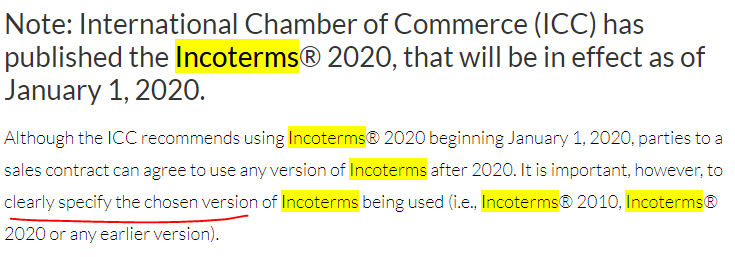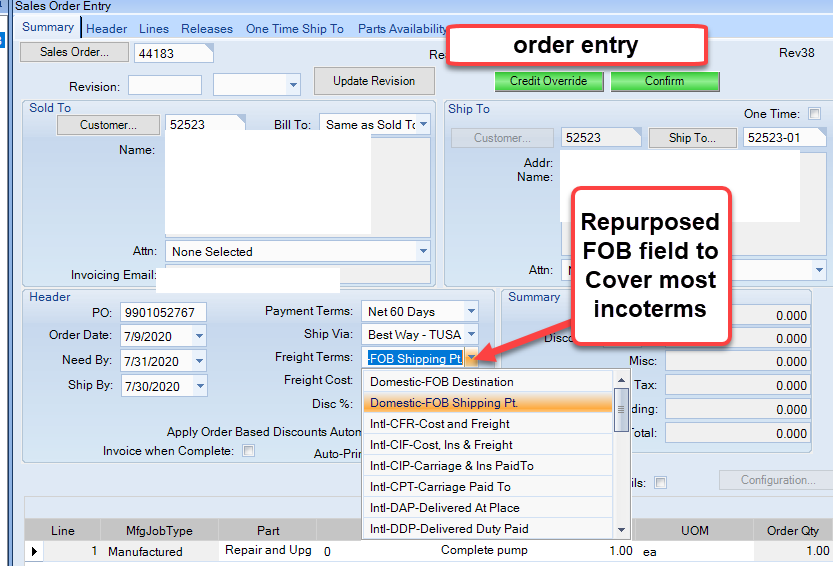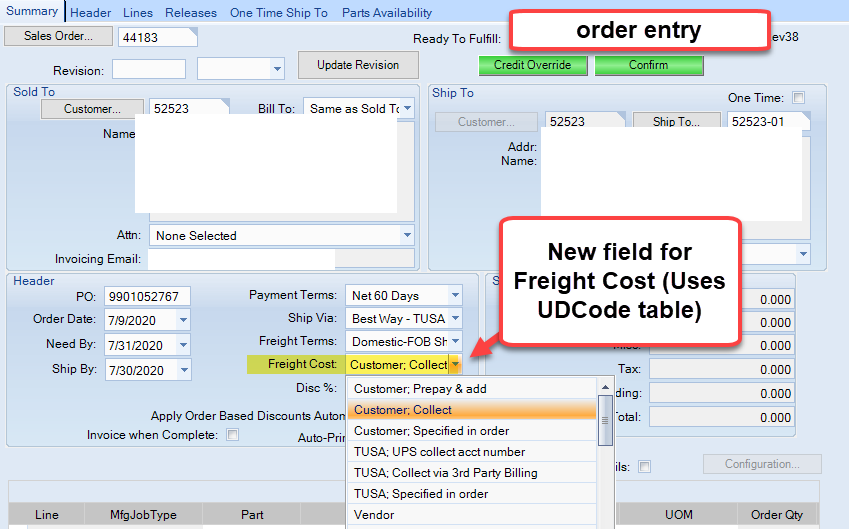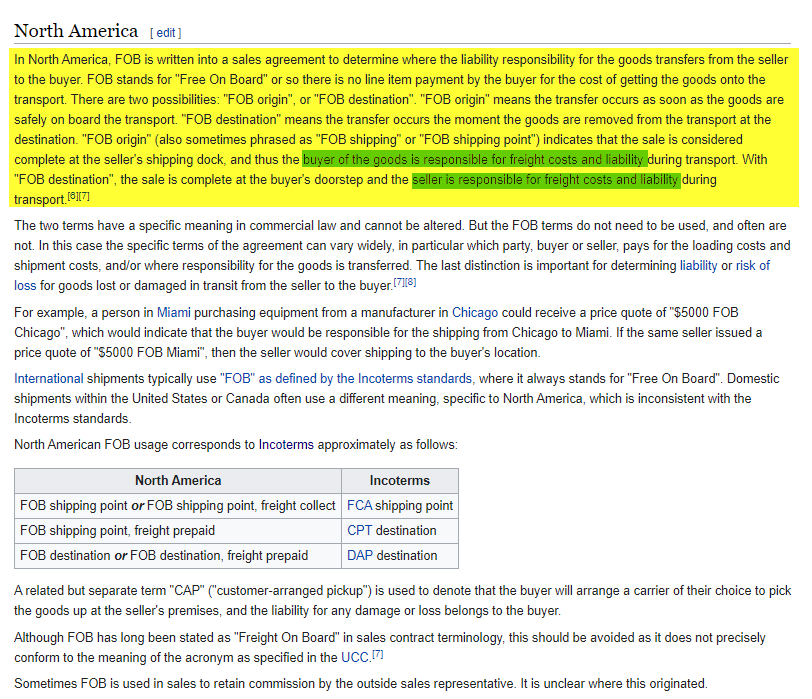I am curious about everyone’s thoughts, opinions, expectations, and business needs in regards to the FOB field.
In almost every implementation I’ve done this has been a topic of confusion or at least a lot of questions. Here is a list on thoughts, comment and what I’ve seen, please comment and discuss as I would like to put in an enhancement request but would like a lot of feedback:
-Isn’t the FOB the same as ‘Freight Terms’
-Why isn’t the FOB on Quotes (I’ve frequently have been asked to add a UD field for this, has anyone asked Epicor about this and rec’d an explanation?)
-Doesn’t Incoterms replace FOB, so is FOB just an older term?
-Shouldn’t FOB just be part of CSF Modules so it’s values can match the latest IncoTerms per country?
My userstandanding:
Freight Terms is about who’s paying for the Freight. INCOTERM (FOB is but one) is about where does the transfer of ownership take place.
FOB should be on quotes.
FOB is one INCOTERM of many.
INCOTERMS should be adopted world-wide, IMHO. I wouldn’t want to buy a EU CSF just to ship there.
Tim Shoemaker had some comments on this Idea proposal:
I agree with Mark. Its better to change the FOB to Freight Terms/Incoterms and to be included as part of std. Epicor as it is world wide.
on the inbound (Demand) file, FOB is important to capture what your customer expects in terms of your shipping agreements, and expects to see that on the Invoice and sometimes the ASN. So, if you’re mandated to exchange your documents via EDI, you’ll want to pay attention to what your customers are sending in their 850 FOB segments for your shipping terms. Also, sometimes, they have a message/notes field which is used in conjunction with the FOB in terms of shipping instructions/SLAs.
I have been referring our customers to the Wiki article here: Incoterms - Wikipedia for definition of FOB code in Epicor.
FOB is only ONE of the Incoterms described in that article.
After reading… I wonder one reason we don’t use the word “Incoterm” directy isn’t because it is a registered trademark of the International Chamber of Commerce.
I agree that outside of USA, Incoterms are important, and they are also important when US companies are involved with international shipments. BUT the vast majority if Domestic US companies are doing the majority of their shipping domestically, and fall under the more casual use described in this article: FOB (shipping) - Wikipedia (FOB Shipping Point, FOB Destination) describing the to point at which a seller is no longer responsible for shipping cost.
@jmontague EDI, good point! Most of the functionality in Epicor is usually based on some type of published standard or guideline, like APICS or GAAP. If FOB is a ‘standard’ field in a ‘standard’ EDI file then that’s probably why it’s there, or it’s a hold over from way older versions of the software.
So is there a ‘standard’ EDI file type that includes or takes IncoTerms into account?
In the US we use ANSI X12 where Europe uses UN/EDIFACT for EDI standards because everyone gets their own standard. INCOTERMS are in fact a standard code in EDIFACT documents. As Tim says, for companies that do business with Europe or in Europe, you want to (have to) use INCOTERMS.
There is still the issue in Epicor that there is no way to indicate transfer of ownership. This is important for Revenue Recognition purposes (ASC606). Epicor needs two bits of capability to do this. A code like INCOTERM, whatever you want to call it, to agree to ownership transfer. The software would also need a Shipped-Not Transferred flag and a way to maintain it. When transfer of ownership is complete, a transaction would clear that flag. One could attach proof of ownership documents to that transaction. It might also then allow the shipment to be invoiced as well.
A quick search of Google shows people putting the INCOTERM for 850 documents in FOB segment.
Hi Rick,
We customized all of our programs to use Incoterms in the FOB and then since that didn’t provide enough info for us, in that we wanted to cover who was paying with clarity, we added a UD field to provide Freight cost selection. We put this on customer entry/tracker, and order entry/tracker, and quote entry/tracker. Then there were the reports. A PIA at first, but it has worked well for us for several years now.
Nancy
And what Nancy did is exactly what I think Epicor could do. Add the Incoterm information to the current FOB table, rename it or not - doesn’t matter. It keeps the US stuff similar but gives you the ability to add more terms to cover INCOTERMs.
Freight Cost is in the Manifest tab already, so some of that functionality is already there but it’s not easily surfaced as Nancy has on her screen. It stores the account numbers for the various carriers, etc. The carriers are hard-coded, so it would be nice just to make it a table similar to Nancy did here.
Mark,
How we’re dealing with the revenue recognition issue is we started using the “AR Clearing” functionality. When the item ships, the costs move from inventory to an inventory in transit account. We don’t post the actual invoice until the ownership transfer has occurred. At that point, when the invoice is actually posted, the inventory in transit is cleared to COS. It’s a bit of a pain to manage especially if you have a high volume of shipments where ownership doesn’t transfer until days (or weeks) later. A definite opportunity for Epicor to improve the process for their international customer base.
VOTE! https://epicor-manufacturing.ideas.aha.io/ideas/ERP-I-143
And add your comments to the thread. I think the comments help on these ideas when users list why any of them are important to your enterprise.
There’s a bigger problem with Intercompany shipments. Stuff “disappears” during the time something ships and it is received. This is unlike Transfer Orders where Epicor does handle the accounting correctly. Same problem but unrelated to INCOTERMS.
Yes +1 @Mark_Wonsil go to that idea and vote!
I have added a comment on that enhancement idea back to this thread.
Please vote!!!
And keep sharing your ideas, struggles and solutions regarding Freight Terms.
So “FOB” really refers to shipping costs?
I was told (way back when I was just a college co-op), that it was about ownership. For example, “FOB our dock” meant that the item became the property of customer the instant it left our dock. And if the UPS truck got hit by a meteor after exiting our driveway, it was the customers loss, not ours. But now this sounds way wrong.
That was what I was taught too.
(But… that was quite a while ago, much simpler times).
P.S.
Hmm… and quick search, still seeing some FOB links that reference ownership
Also … I thought it was “Freight On Board”
FYI… checking the embedded help from V8 - Order Entry, Summary & Header
FOB - The point at which the ownership title for the shipped goods changes to the customer.
For example: * DEST, * US
You do not need to enter a Free On Board value for a credit memo.
FOB in North America does seem to mean “Free On Board”, but the definition is about when the ownership transfer happens as well. This is a snapshot from Wikipedia.
And now it is coming back to me, why FOB sticks in my head a little.
A site I once worked for had shipped a container to SE Asia.
The ship sailed thru a cyclone and the container had a couple of feet of sea water when it arrived at it’s destination port.
The entire electrical system had to be replaced on a fairly large piece of capitol equipment.
There was a law suit to determine whose insurance company was liable.



